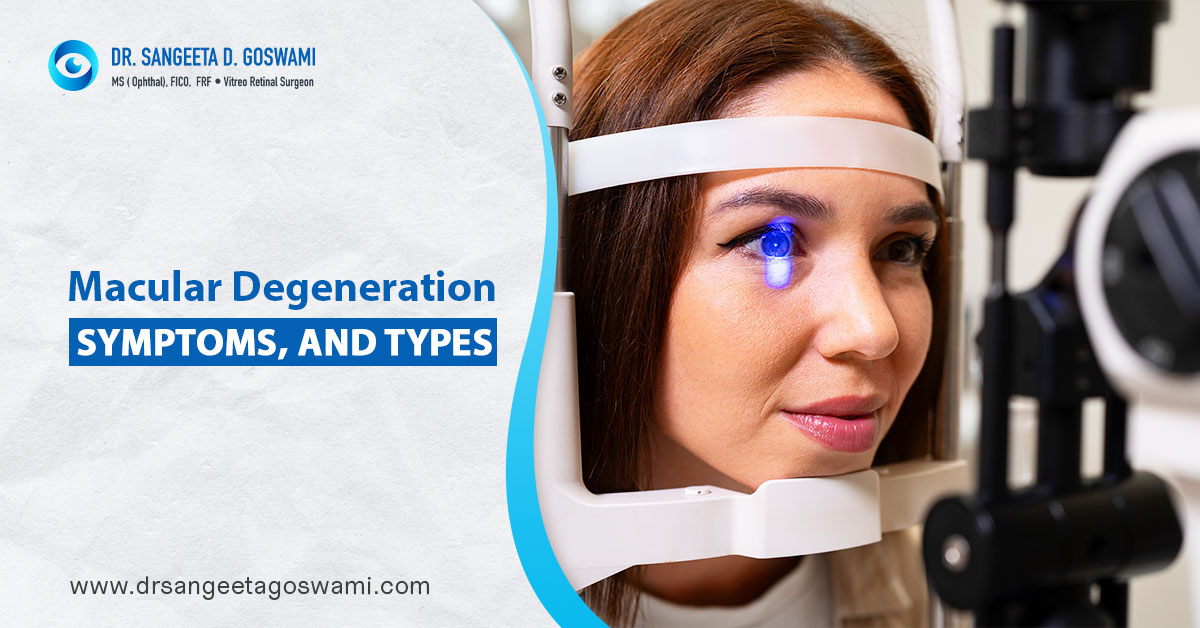Macular degeneration is more often an age-related eye condition affecting the central vision. Damage to the macula of the retina causes MD, leading to vision loss. There are two forms of macular degeneration – dry and wet. Dry macular degeneration is more common, responsible for about 90% of all MD cases.
Consult the best eye doctor in Siliguri for comprehensive eye care and advice. While there is no exact cure for MD, lifestyle changes and treatment can protect vision health to a great extent.
In 2022, this eye disease affected over 200 million people. More commonly, MD affects people over 50. It is estimated that the number of MD cases could increase to 288 million by 2040 worldwide. Untreated macular degeneration can lead to vision loss in people over 60.
Macular Degeneration Overview
The macula is the central section of the retina, while the retina is at the back of the eye. This light-sensitive layer converts lights entering the eyes into electrical signals. Then, the retina sends them to the brain. MD damages the macula, the central part of the retina. People with macular degeneration generally have no issues with their peripheral (side) vision.
Macular Degeneration – Understanding the Symptoms
Symptoms of MD may differ based on the reason and how severe is the condition. Here are the common signs and symptoms of macular degeneration:
Blurry Vision: One of the very first and most common symptoms of MD is a gradual blurriness of your central vision. People with MD may find it difficult to see fine details even in proper lights.
Dark or Empty or Blind Spots in Your Central Vision: You may notice dark or empty or blind little spots in the center of your vision, one of the signs of MD.
Difficulty Seeing in Low Light: MD makes it difficult to see or recognize familiar things or faces in low light levels.
Changes in Colour Perception: Macular degeneration often changes how you see colours.
Distortion: With untreated macular degeneration, straight lines may appear wavy or distorted, which is medically termed metamorphosis.
You can consult the best eye doctor in Siliguri for advanced macular degeneration tests and treatment.
When to See an Eye Doctor for Macular Degeneration?
If you have any such symptoms, like low vision, blind spots in central vision, blurry vision, or problems seeing in low light, visit an ophthalmologist or eye specialist. These signs can indicate other eye conditions as well. Therefore, medical attention or diagnosis is vital to treatment. See the top eye doctor in Siliguri for age-related macular degeneration.
Risk factors for macular degeneration are often related to older age. However, certain factors can increase the risk of MD for older adults and younger people, such as:
· Diabetes
· Family history of MD, especially in a first-degree relative
· Obesity or excessive body weight
· High blood pressure/hypertension
· Consuming high saturated fats
· Smoking
Macular Degeneration – Understanding its Types - Two types of MD include:
Dry/ Atrophic Macular Degeneration
The most frequent type of macular degeneration is dry macular degeneration. AMD affects about 80% to 90% of people globally, but the exact cause is unknown. Generally, AMD affects one eye at a time.
These may be genetic and environmental factors responsible for dry macular degeneration. This type of MD starts when the light-sensitive cells in your macula slowly break down. In the early stage of AMD, there are typically no symptoms. Later, you may experience symptoms like:
· Diabetes
· Family history of MD, especially in a first-degree relative
· Obesity or excessive body weight
· High blood pressure/hypertension
· Consuming high saturated fats
· Smoking
Wet / Exudative Macular Degeneration
It’s a less common type of macular degeneration, but more severe. This is a long-lasting eye disorder that occurs when blood vessels leak blood or fluid into the central part of the retina.
Wet macular degeneration quickly worsens the vision and begins as dry macular degeneration. The exact cause of wet macular degeneration is unknown as well. Sometimes, early treatment can heal vision loss.
Symptoms of wet macular degeneration occur suddenly, including:
· Reduced central vision in both/one eye
· Problem recognizing familiar faces
· Seeing straight lines bent
· Blurry vision
· Problems seeing in low light or blurry spots in the field of your vision
In the early stages of macular degeneration, vision remains mostly unaffected. When MD reaches an intermediate level, you may have a blurry or wavy vision. In advanced stages of macular degeneration, mostly there is complete central vision loss.
An annual eye examination is vital to macular degeneration diagnosis because symptoms aren’t noticeable in the early stage of MD. If an eye doctor finds any changes in your retina, your doctor will go for further tests, like the Amsler Grid Test, dilated eye exam, and optical coherence tomography. Visit the most trusted eye specialist doctor in Siliguri for personalized eye care.





Comments